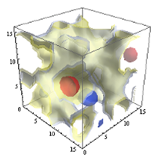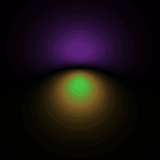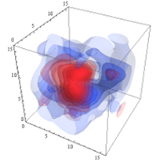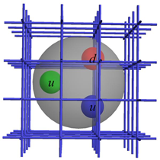LGT4HEP: Courses
Students who enter this traineeship are expected to complete the following course requirements:
Fundamental Courses
Graduate-Level Computational Physics (should cover at least Python, C++, algorithms)
Some students may have taken such a class during their senior year as undergraduates. We will consult with students and test their understanding. If they have sufficient background, we would recommend them to take courses like topics in quantum computing or machine learning that give more background in preparation for lab training involving these topics.
Parallel Computing (in C or C++)
Typically offered by universities in the computer-science or engineering department, if not in physics
Quantum Field Theory I (and relevant prerequisites)
Lattice-QCD Courses
We will also require students to complete two semesters of lattice-QCD training courses (more details later) so that we provide knowledge and hands-on experience essential to their lattice-QCD work.
In the first semester, there are student-led lectures, where a small group of students will be given assigned readings and work among themselves with an assigned instructor to design lecture notes and presentations for other students, as well as example problems for the rest of the class. The topics covered will include From path integral to QCD: overview of continuum theory; Lattice scalar theory to gauge theories on a lattice; Common Fermion actions and chiral fermions; Renormalization on the lattice; Computing Algorithms and HPC on the lattice; Quantum Computing and Simulation and Machine Learning in LQCD.
In the second semester, the course will be in the flipped-classroom style, where students learn a set of materials, either through reading and/or learning videos, before the class, ask instructors about any confusion concerning the learning materials, and proceed to work on applications of the concepts, such as data analysis with real lattice data. The topics to be covered are Effective field theories; QCD in a finite volume: Scattering and decay amplitudes; Hadron Spectroscopy, Light Nuclei, and Resonance; Structure of Hadrons; Flavor Physics and muon g-2; Finite Temperature and Density; Heavy Quark Physics; BSM physics on the lattice. There are also in-person tutorials organized by LGT4HEP team, right before USQCD All-Hands Meetings.
Summer School
Students should take advantage of the existing summer schools that are already funded by DOE and NSF to further advance their background in HEP and computing topics. A few examples are listed below:
- Computational HEP Traineeship Summer School ( 2024 school program, 2023 school program)
- Argonne Training Program on Extreme-Scale Computing (ATPESC) (ATPESC 2023)
- High-Performance Computing (OLCF, LBNL)
- Advanced Cyberinfrastructure Training at RPI
- CTEQ Summer School (every other year in Pittsburgh)
- Fermilab summer schools
- Annual GPU Hackathon at BNL
Contact your local mentor in the Spring semester to find out more details.
Sponsors
This traineeship is sponsored by DOE HEP Computing traineeship.





